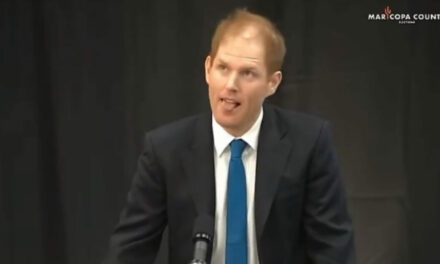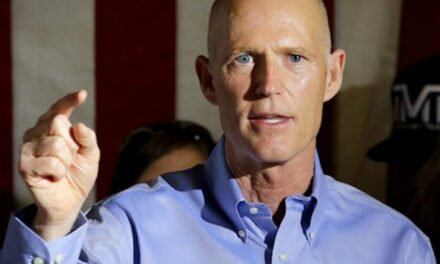We support our Publishers and Content Creators. You can view this story on their website by CLICKING HERE.
In an exclusive interview with our editor-in-chief, Dr. María Herrera Mellado, Carlos Pineda, former Guatemalan presidential candidate in the 2023 elections, shared his vision on Guatemala’s political challenges and his role as an emerging leader. Conducted during CPAC Mexico 2024, the conversation touched on foreign interference, the growing influence of progressive leftist movements, and the obstacles he faced during his candidacy. Pineda’s insights provide a compelling view of Guatemalan politics and his fight for meaningful change in the region.
The Outsider Threatening the Status Quo
Carlos Pineda is not your typical politician. With a brief political career, he positioned himself as an “outsider,” challenging Guatemala’s entrenched political structures.
“There has never been a legitimate libertarian or right-wing government in Guatemala,” he remarked, criticizing how economic elites have historically funded campaigns in exchange for political favors. This system, Pineda argued, allows the left—often supported by foreign interests—to falsely present itself as the people’s savior.
Pineda’s campaign gained traction quickly through digital platforms, but his rise, he claims, threatened both the corrupt traditional right and the progressive left supported by international actors.
“We were taken out just a month before the elections,” he recounted, alleging judicial manipulation by bribed judges, which delayed ballot printing and ultimately disqualified his candidacy.
Foreign Interference and Hidden Agendas
Pineda strongly condemned foreign interference in Guatemala, particularly by the United States and Europe.
“They are destroying us from within,” he asserted, criticizing these nations for funding progressive agendas under the pretext of promoting human rights—agendas that, according to him, clash with Guatemala’s conservative values.
A focal point of his critique was abortion. Known as the pro-life capital of the Americas, Guatemala’s stance is, Pineda argued, under siege by international influence, including from the current U.S. administration.
“This administration, led by someone who claims to be Catholic, funds the abortion of a million babies annually in the U.S. and promotes it abroad,” Pineda declared, emphasizing the stark cultural divide.
He also accused USAID and the U.S. State Department of pushing political agendas rather than genuine development. Instead of fostering growth, these institutions, Pineda said, fund NGOs that hinder agricultural and economic progress under the guise of environmental protection.
“They are not investing in development programs,” he stated, lamenting that most U.S. aid fails to reach its intended recipients.
The Future of Guatemala: Is There Hope?
Despite the challenges, Pineda remains optimistic about Guatemala’s future and its role in shaping regional change. He underscored the need for civic engagement to prevent the country from falling under the control of entrenched elites.
“We need more Guatemalan leaders who love their country to rise up,” he said, advocating for leaders committed to the common good.
However, Pineda emphasized that Guatemala’s progress—and that of the region—depends on a shift in U.S. policies toward Hispanic America. He criticized the U.S. for neglecting its southern neighbors in favor of stronger ties with Asia and Europe.
“It’s time for them to see us as their main allies,” he urged.
Pineda also called for more effective measures against illegal immigration and organized crime. As a transit country for migrants heading to the U.S., Guatemala plays a critical role.
“Mass migration doesn’t benefit us either,” he said, pointing out how the exodus of talent weakens local economies. He believes the solution lies in creating opportunities within home countries to reduce forced migration.
Bukele’s Legacy and Pineda’s Aspirations
Pineda expressed admiration for Salvadoran President Nayib Bukele, calling him a “crack” for his approach to combating crime. He emphasized that development is impossible without security and sees Bukele’s success as a model for the region.
Nevertheless, Pineda acknowledged that each country faces unique challenges. For Guatemala, he argued, the focus should be on boosting family incomes, reducing poverty, and fostering economic growth. Achieving this, he said, requires a long-term strategy that invests in people—not through handouts, but by equipping them with the tools to succeed.
Final Reflection: Is Real Change Possible in Guatemala?
Carlos Pineda’s insights highlight Guatemala’s dual struggle: battling local corruption while resisting international efforts to impose progressive agendas contrary to the country’s traditional values.
Yet, his message remains one of hope. Pineda believes that real change is possible if Guatemalans unite and work toward a better future.
The road ahead is undoubtedly challenging. Like many nations in Hispanic America, Guatemala has long been treated as a resource supplier for foreign powers. Changing this dynamic, Pineda argued, will require strong leadership and a sustained commitment to human and economic development.
The next presidential election in Guatemala, coupled with U.S. foreign policy toward the region, will be critical in determining whether this change can take hold. Until then, Pineda continues to advocate for a more equitable and prosperous Guatemala, envisioning a future where emigrants return to a nation offering opportunity and security for all.
María Herrera Mellado es una abogada respetada, licenciada en EE.UU. y España, con un doctorado en Ciencias Jurídicas y títulos de la Universidad de Granada, la Universidad de Arizona y la Florida International University. Con amplia experiencia en derecho internacional, inversiones, inmigración, derechos humanos, protección de la privacidad y lucha anticorrupción, ha asesorado a organizaciones y políticos hispanoamericanos. Ha escrito sobre seguridad nacional e inmigración, protección de datos, derecho constitucional, consumo financiero y derecho bancario en revistas internacionales y coescribió libros publicados en Perú y Colombia. Reconocida por su servicio comunitario, es considerada una de las mujeres más influyentes de Florida. Es experta en varios idiomas y participa frecuentemente en debates en canales como Univisión y Telemundo
María Herrera Mellado is a highly respected attorney, licensed to practice in both the U.S. and Spain. She holds a PhD in Legal Sciences and has earned degrees from prestigious institutions, including the University of Granada, the University of Arizona, and Florida International University.With extensive expertise in business law, immigration, human rights, consumer protection, privacy protection, and anti-corruption, María has advised a wide range of organizations and Hispanic American politicians. She has published numerous articles on data protection and banking law in international legal journals and co-authored books on these topics, which have been published in Peru and Colombia. Known for her strong commitment to community service, María is recognized as one of the most influential women in Florida. Fluent in multiple languages, she frequently participates in high-profile debates on networks such as Univisión and Telemundo, where she shares her insights on key legal and social issues.

 Conservative
Conservative  Search
Search Trending
Trending Current News
Current News 





